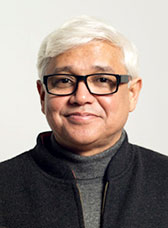One of the most widely acclaimed South Asian writers writing in English today, Amitav Ghosh was born in Calcutta, India and educated in Delhi, Oxford, and Alexandria. In 1982, he earned a D.Phil. in Social Anthropology from Oxford University. Since then, he has earned recognition for his work as a novelist, a social anthropologist, an historian, a travel writer, and a chronicler of ancient and lived histories. His literary oeuvre includes eight novels, five non-fiction volumes, numerous essays, and articles in Cultural Anthropology, Subaltern Studies, New York Times, the New Yorker, and so on.
Amitav Ghosh’s work cuts across cultural and national borders to explore individual human dignity and aspirations in times of war and peace, in the aftermath of natural calamities, and in response to colonial and postcolonial conditions. His first novel, The Circle of Reason (1986), which won the Prix Médicis Etrangère, one of France’s highest literary awards, chronicles the adventures of a master weaver as he journeys from Bombay to Africa. The Shadow Lines (1988) focuses on the narrator’s family in Calcutta and Dhaka and its connection with an English family in London. The Calcutta Chromosome (1996), a mystery thriller that brings together three searches occurring in different global locations and different historical periods, won the Arthur C. Clarke Award for best science fiction in 1996. With the publication of his novel The Glass Palace in 2000, Ghosh established his position firmly as one of the most dynamic writers from South Asia. Set primarily in Burma and India and chronicling the events of an entire century, this novel is a riveting tale of love and family, and most important, the repercussion of British colonialism on multiple nations and ethnicities. His 2005 novel The Hungry Tide, set in the Sundarbans delta and narrating the adventures of an Indian-American marine biologist, won him India’s Crossword Book Prize. Since then, Ghosh has published the first two volumes of his Ibis trilogy, Sea of Poppies (2008) and River of Smoke (2011), both shortlisted for the Man Booker Prize. The final volume from the trilogy, Flood of Fire, is due out in spring 2015.
A review of his nonfiction work reveals a writer of yet more expansive vision. His first collection of essays, In an Antique Land (1992), chronicles the relationship between Egypt and India from his experience as a young doctoral student in an Egyptian village. Incendiary Circumstances (2006), containing essays on his reaction to the 9/11 terrorist attacks and to the effects of the 2004 tsunami in the Indian Ocean, won him an Asian American Literary Award.
In recognition of his work, in 2007, Ghosh received the Padma Shri, India’s fourth highest civilian honor, the Dan David Award (with Margaret Atwood) in 2010, and the International Grand Prix of the Blue Metropolis Festival in Montreal in 2011. His work has been translated into more than twenty languages, and he has taught in many universities in India and the US.


